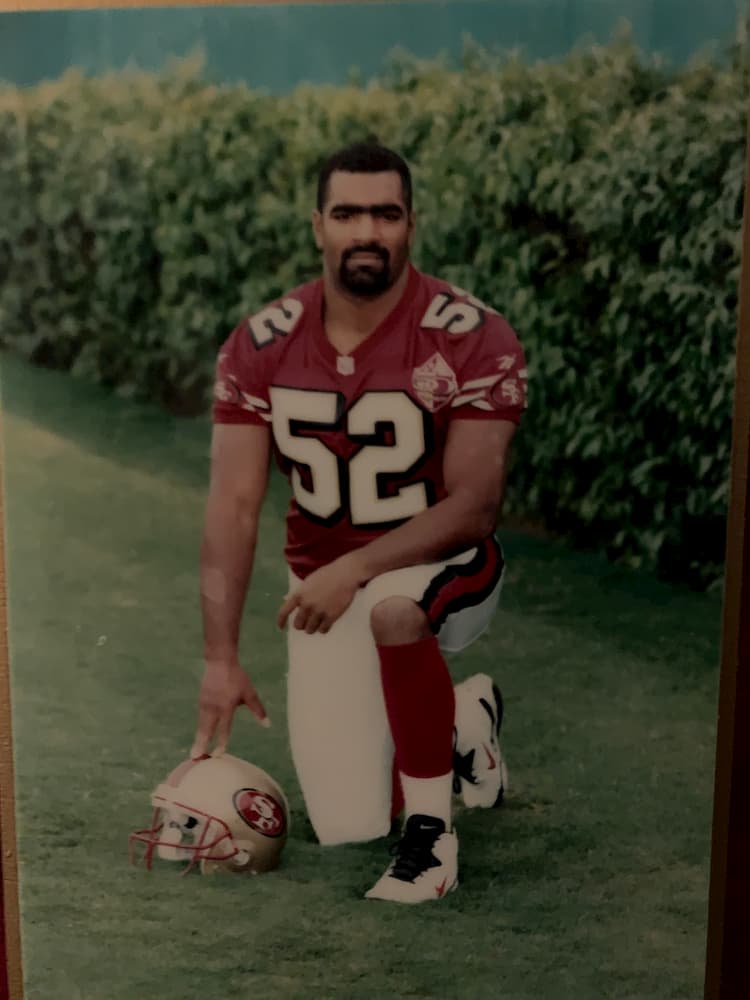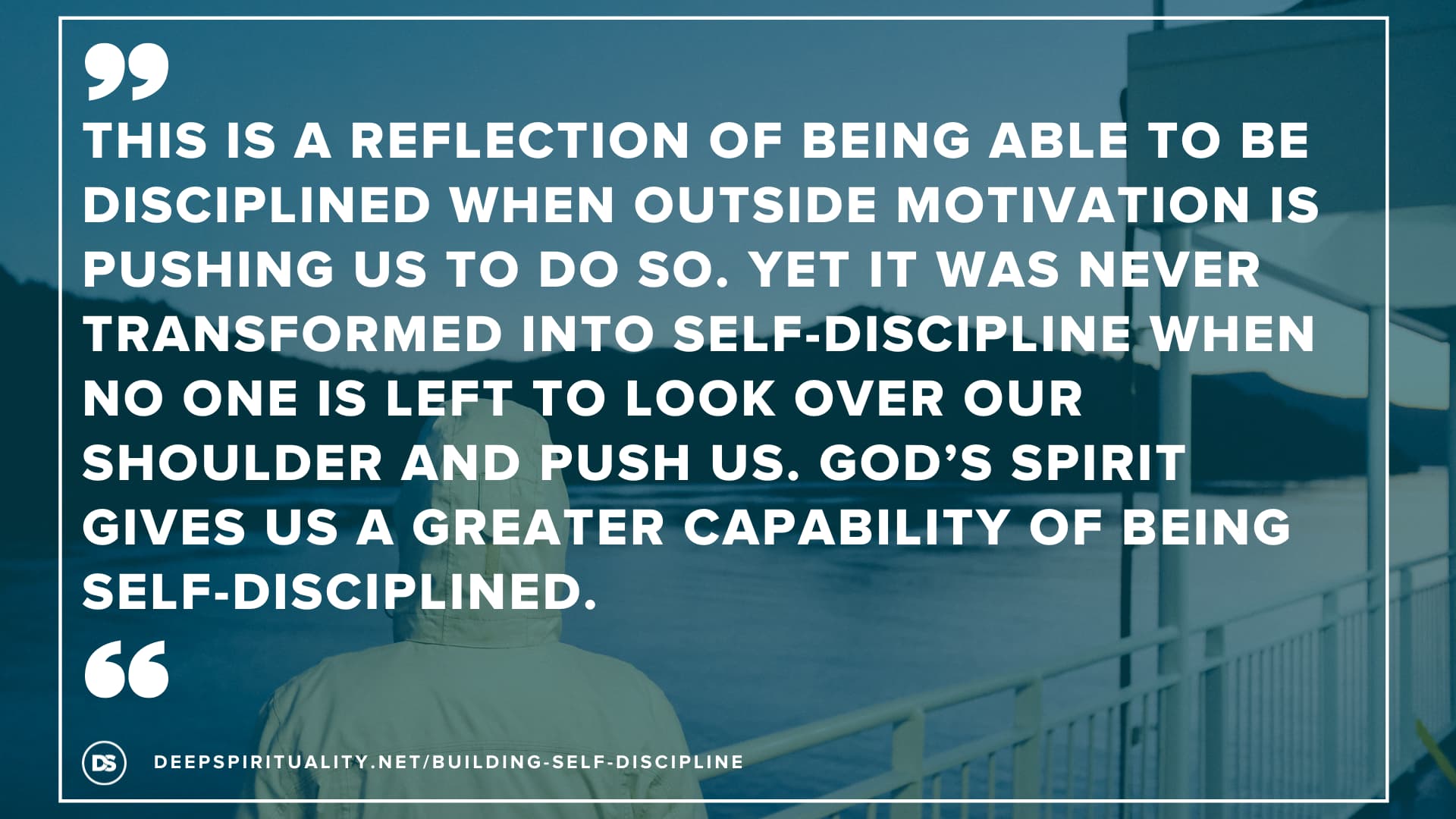During my second year of playing football with the San Francisco 49ers, my coach told me that I would be starting at the outside linebacker position in the first preseason game against the San Diego Chargers.
The closer we got to the game, the more anxious I became. During the game, I struggled to perform because the pressure intensified my anxiety and fear of failure. My fears paralyzed me, and my anxiety kept me from thinking clearly and making the right decisions.
Although I was given an incredible opportunity, I wasn’t able to capitalize on it because of my lack of self-discipline. The experience taught me a truth that, while God created us all with innate abilities and talents, discipline is the quality that enables us to bridge the gap from aspiration to accomplishment.

49ers player photo 
Sam and his brother Sandor
Proverbs 4:13 GW
Cling to discipline. Do not relax your grip on it. Keep it because it is your life.
To this day, I still struggle to embrace building self-discipline. I am grateful for God’s Word which helps me understand that discipline is foundational to fulfilling the purpose that for which God has created me.
…Yet each one of you must run the race to be victorious. [25] A true athlete will be disciplined in every respect, practicing constant self-control in order to win a laurel wreath that quickly withers. But we run our race to win a victor’s crown that will last forever.
[26] For that reason, I don’t run just for exercise or box like one throwing aimless punches, [27] but I train like a champion athlete. I subdue my body and get it under my control, so that after preaching the good news to others I myself won’t be disqualified.1 Corinthians 9:24-27 TPT
Being a Christian is far more than attending church services; it’s about being a winner. God calls us to be victorious, and it is important for us to know that these victories begin inside us — with discipline and self control.
Jim Rohn said “Discipline is the foundation upon which all success is built. Lack of discipline inevitably leads to failure.”
Discipline is the key to us winning in our relationships, whether it be in faith, marriage, family, career, dating, with roommates or classmates. Learning to develop discipline is essential if we are going to experience the victories God has destined for us.
3 keys to becoming disciplined so that we can “win from within”:
- Discipline in our priorities: It flows from God
- Discipline in our practice: It grows with exercise
- Discipline in our purpose: It shows others the way
Discipline in our priorities
Discipline starts with God.
Let’s face it, we cannot accomplish everything we want. We are faced with daily choices and are called to make decisions on what matters the most to us. To make choices that matter we will have to renounce certain things we might want or prefer to do.
Everything isn’t of the same value and importance, and discipline helps us put first things first. Abraham Lincoln once stated that discipline “is choosing between what you want now and what you want the most.” If we are going to develop discipline, we need to start by having our priorities right and beginning with what should matter most: walking with God.
For the Spirit God gave us does not make us timid, but gives us power, love and self-discipline.
2 Timothy 1:7 NIV
This scripture teaches us that God’s Spirit provides us with the capability of being self-disciplined (inner ability to control ourselves). Because of this, we can be sure that discipline is possible for all who choose to have a close relationship with God.
And the good news is that God’s discipline is transformational (Hebrews 12:10-11 TPT). In addition, there is a difference between discipline and self-discipline.

Self-discipline comes from within and is our ability to take external discipline which can come in many forms (experiences, hardships, circumstances, people) and turn it into our own internal motivation and convictions. For example, there are many professional athletes who, after retiring, allow themselves to get out of shape.
This is a reflection of being able to be disciplined when outside motivation is pushing us to do so. Yet it was never transformed into self-discipline when no one is left to look over our shoulder and push us. God’s spirit gives us a greater capability of being self-disciplined.
It is also important to make the point that discipline by itself isn’t synonymous with being spiritual and close to God (Colossians 2:22-23). Many people are able to be disciplined in certain areas of their lives without having a relationship with God.
The self-discipline a relationship with God kindles in our hearts teaches us to love.
However, the self-discipline a relationship with God kindles in our hearts teaches us to love and helps us change the world around us. Therefore, building our relationship with God should be our top priority.
Maybe you are like me and you find spending daily focused time with God challenging. Like Martha in Luke 10:42, I can approach my times with God stressed, upset, and worried about my responsibilities and the potential harm my failures could do to my image or esteem.
I can be reading my Bible but not really listening for what God is telling me. Or I skip listening to God altogether by not reading my Bible. This is all a lack of discipline that de-prioritizes God and has consequences.
[41] “Martha, Martha,” the Lord answered, “you are worried and upset about many things, [42] but few things are needed—or indeed only one. Mary has chosen what is better, and it will not be taken away from her.”Luke 10:41-42 NIV
When we are self disciplined, then we are able to choose what is better, which is listening to God. When we lack discipline, we become driven by our emotions or desires and are ensnared to the sins that ensue (James 1:14-16). The Pharisees had a similar problem.
[23] “Great sorrow awaits you religious scholars and Pharisees-frauds and pretenders! For you are obsessed with peripheral issues, like insisting on paying meticulous tithes on the smallest herbs that grow in your gardens. These matters are fine, yet you ignore the most important duty of all: to walk in the love of God, to display mercy to others, and to live with integrity. Readjust your values and place first things first. [25] “Great sorrow awaits you religious scholars and Pharisees-frauds and imposters! You are like one who will only wipe clean the outside of a cup or bowl, leaving the inside filthy. You are foolish to ignore the greed and self-indulgence that live like germs within you.Matthew 23:23,25 TPT
In this passage, Jesus challenges the Pharisees to put their priorities in order and choose to be disciplined about what was the most important – love. He also teaches us that when we are not disciplined in our priorities, it will lead to great sorrow. When we are disciplined and clear in our priorities, it will protect us from having our lives overrun with greed and self-indulgence.
Here are 3 priorities we can choose to exercise the discipline God desires for us to become more loving:
- Prioritize knowing God (Hosea 6:6 NLT, Philippians 3:7-10 TLB) – Decide to start your day with your quiet time with God.
- Prioritize your faith (Romans 10:17 NIV, Luke 22:31-32 Voice) – See pressure and failures as an opportunity to grow in our faith.
- Prioritize the right friends (I Corinthians 15:33 ERV, Proverbs 1:10 TPT) – Choose spiritual friends that will bring the best out of you.
When we exercise discipline and choose to prioritize our relationship with God, it will lead to the inner victories we are seeking.
Reflection questions
- What do my priorities teach me about what I value most?
- Where do I need to grow in my priorities (God, faith, friendship)?
- How will choosing the right priorities improve my relationships?
Discipline in our practice
Discipline grows with exercise.
While playing in the NFL on the practice squad, a teammate of mine often told me that I had great potential. He then always went on to remind me that potential was another way to say that I hadn’t yet accomplished anything.
Whoever loves discipline loves knowledge, but whoever hates correction is stupid.
Proverbs 12:1 NIV
Here’s the truth: information without application makes us ineffective and unproductive. Discipline is what helps us bridge the gap between knowing (loves knowledge) and accomplishing (loves discipline), between having potential and fulfilling our destiny. This can only happen through consistent, focused practice and repetition.
Where there is no vision, the people are unrestrained, But happy is he who keeps the law.
Proverbs 29:18 (NASB)
The Scriptures teach us that where there is no vision, people are unrestrained and uncontrolled. This implies that vision plays a crucial part in us being willing to be self-controlled or restrain ourselves. When we can see God’s bigger vision for our lives, we are more motivated to be disciplined.
When I was 12 years old, my mom walked in on me while I was smoking a cigarette in my room. While I did my best to hide it behind my back, the smell of the cigarette had already filled the room. I remember being worried and afraid of my mother’s reaction.
She looked around my room at all the pictures of college football players I had pinned up on my walls and simply said, “You know if you are going to play college football, smoking isn’t going to help you.” And she proceeded to walk out of my room. Her one comment motivated me to never smoke a cigarette again in my life. The vision she provided helped motivate me to exercise the discipline necessary to stop.
How To Manage Your Home During The Pandemic
In the midst of dealing with the ongoing stress of 2020 and the pandemic, it can be easy to just want to run away and hope all of our problems will be magically solved. But no matter where we run, our stress doesn’t leave us.
What is the vision that drives our acts of discipline? Does it help us be disciplined in all areas of our lives or only in those that benefit us?
The good news is that we can find God’s vision for our lives in his Word. The Bible is full of God’s vision for everyone: spouses, parents, children, singles, older men and women, or younger. His vision that inspires our discipline is all over the Scriptures.
In his book The Disciplined Life, Richard S. Taylor writes, “Many have ambitions which are never realized, goals which are never reached, aspirations for usefulness which are never fulfilled, visions which never materialize. There may be a promising start, but not the discipline required to carry through.”
The apostle Paul is a great example of someone who maximized his potential. In the next scripture, we can get an idea of how much vision and disciplined practice was a key factor in him doing so.
“What could I do, King Agrippa? I couldn’t just walk away from a vision like that! I became an obedient believer on the spot. I started preaching this life-change—this radical turn to God and everything it meant in everyday life—right there in Damascus, went on to Jerusalem and the surrounding countryside, and from there to the whole world.
Acts 26:19-20 (MSG)
Discipline is what enables us to put into practice the inspired teaching we get through God’s vision. When we exercise that discipline to obey what we are taught from God’s Word, then our greatest visions and dreams can become our greatest accomplishments.
Reflection questions
- What are God’s vision and dream for my life?
- In what specific areas of my life and heart do I need to embrace discipline?
- How will I get help developing the discipline to turn aspirations into reality?
Discipline in our purpose
Discipline empowers us to show others the way and rather than just tell them.
Whoever heeds discipline shows the way to life, but whoever ignores correction leads others astray.
Proverbs 10:17 NIV
When we pay attention to God’s voice which leads us to discipline and experience the victories he wants us to have, our lives show others what they are capable of with God.
This is especially true with those we live within our homes (Ephesians 6:4 TPT). There is a glaring difference in the influence I have on my wife and kids between when I choose to pay attention and respond to God’s discipline and when I don’t.
Nothing inspires my family more than seeing me embrace training and discipline.
The more I listen and am transformed by God’s discipline, the more I’m able to love my family. On the other hand, when I’m undisciplined and neglect parenting, serving and training my family, the more disrespect grows rampant in my home (Hebrews 12:8-10).
Nothing inspires my family more than seeing me embrace training and discipline to work on my weaknesses and shortcomings only to come out of it stronger. We all need correction in our personal areas of weaknesses. The correction and discipline we receive strengthens us and ends up being a model for others of how transformative God’s discipline is.
[22] I’ve been broken, lost, depressed, oppressed, and weak that I might find favor and gain the weak. I’m flexible, adaptable, and able to do and be whatever is needed for all kinds of people so that in the end I can use every means at my disposal to offer them salvation. 1 Corinthians 9:22 Voice
The passage teaches that Paul adapted, or disciplined himself to be what he needed to be in order to offer salvation and freedom to others. Paul was not being disingenuous pretending to be weak where he wasn’t. On the contrary, he was aware of his own limitations and challenging life experiences all the while still being confident that God would use those very same weaknesses to lead others into a relationship with him.
It takes discipline to face our personal weaknesses, but once we do, we have the ability to be used by God to help others overcome theirs. Too often, we hide our weaknesses, thinking that they will make us grow distant in relationships. In fact, those very weaknesses are the ones that can connect us and help us develop real intimacy. Through this scripture, I’ve identified 5 areas of weaknesses I can choose to embrace to help others do the same.
- Heartache – “I’ve been broken”
- Loneliness – “I’ve been lost”
- Grief – “‘I’ve been depressed”
- Abuse – “I’ve been oppressed”
- Insecurity – “I’ve been weak”
[5] We are demolishing arguments and ideas, every high-and-mighty philosophy that pits itself against the knowledge of the one true God. We are taking prisoners of every thought, every emotion, and subduing them into obedience to the Anointed One. 2 Corinthians 10:5-6 Voice
The Bible can help us to discipline any thought and emotion to obey God and experience the victories he destined us to have. We need to first learn how to use the Scriptures in facing our weaknesses with God so we can then help ourselves and others “take captive” the troubling emotions caused by the lack of discipline instead of being trapped by them.
Reflection questions
- Which of the 5 weaknesses do I relate with the most?
- Who will I share my life with to give them hope they can overcome their weaknesses?
- How will I use God’s word to learn to discipline my thoughts and emotions?
Explore more:
Sam is a former outside linebacker for the San Francisco 49ers. Since retiring from the NFL, Sam has worked in the ministry serving communities in the Bay Area.
Sam is a former outside linebacker for the San Francisco 49ers. Since retiring from the NFL, Sam has worked in the ministry serving communities in the Bay Area.






